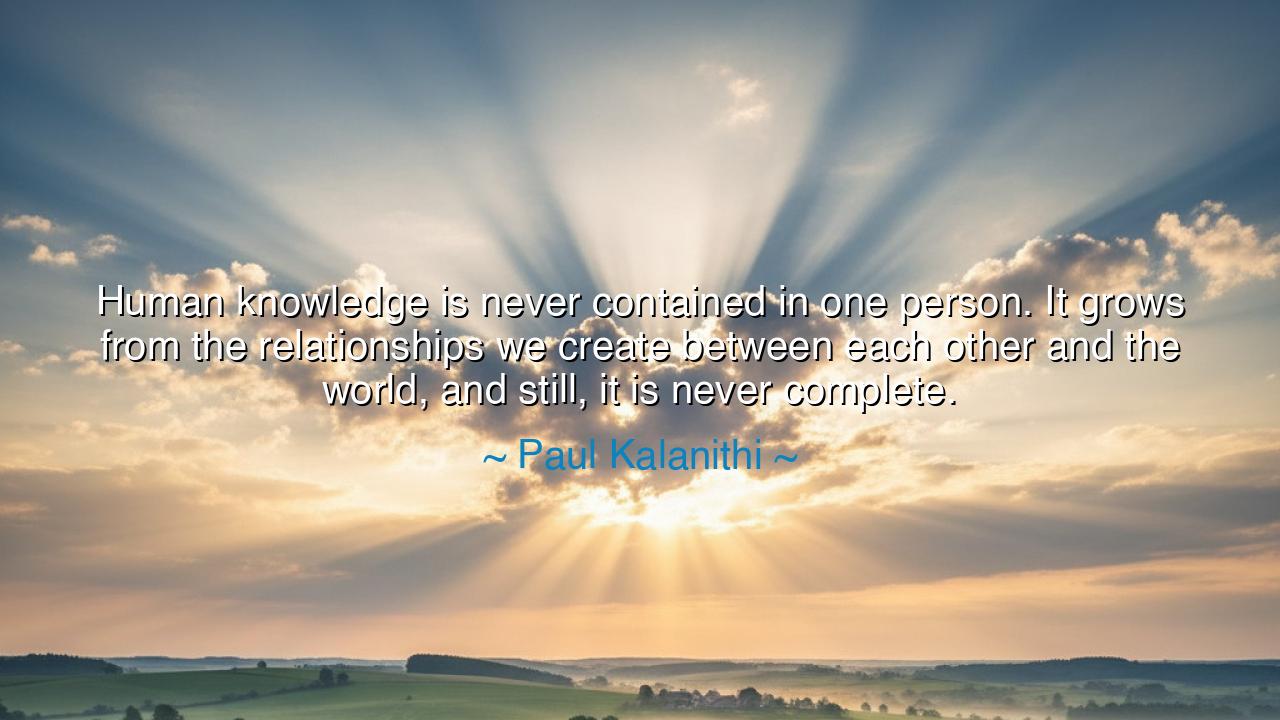
Human knowledge is never contained in one person. It grows from
Human knowledge is never contained in one person. It grows from the relationships we create between each other and the world, and still, it is never complete.






The physician and philosopher Paul Kalanithi, who wrestled with the deepest questions of life and death even as his own life was slipping away, once wrote: “Human knowledge is never contained in one person. It grows from the relationships we create between each other and the world, and still, it is never complete.” These words, forged in the crucible of mortality, bear the weight of both science and spirit. For he reminds us that no single mind can hold the fullness of truth, and that the wisdom of mankind is a tapestry woven of countless threads, always unfinished, always reaching further.
At its heart, this saying declares that knowledge is communal. Though each man or woman may grasp a fragment, it is only in communion—teacher with student, doctor with patient, poet with listener, neighbor with neighbor—that these fragments are bound together into something greater. Knowledge is not hoarded treasure, locked within a single chest, but a living fire that grows as it is shared. And still, Kalanithi tells us, the fire never consumes the whole darkness. There is always more to learn, always mysteries beyond our reach.
History itself bears witness. The Greek sage Hippocrates began the study of medicine, yet it was carried forward by Galen, by Avicenna, by Vesalius, by countless others across the centuries. No single man cured ignorance or perfected science. Each added his fragment to the mosaic, each relied on the relationships between teacher and pupil, between thinker and society. The edifice of medicine, like all human knowledge, stands not because of one mind but because of the eternal chorus of many.
And what of the great Library of Alexandria? It sought to contain all the knowledge of the ancient world within a single place, a single collection. Yet when it burned, much was lost forever. This tragedy proves the truth of Kalanithi’s words: knowledge cannot be contained, cannot be completed, cannot be captured in one person, one book, one place. It is scattered across the earth, written in the lives of people, carried in the exchange between souls.
Kalanithi’s insight also flows from his own life as a doctor. In the practice of healing, he discovered that no knowledge gained from books was enough. The patient’s story, the surgeon’s skill, the nurse’s care, the family’s voice—together these relationships created the true art of medicine. Alone, his training was incomplete; only together did knowledge grow into wisdom. Thus, even in the intimacy of the hospital room, the principle holds: truth is born not of isolation, but of connection.
The meaning for us is clear: we must live as seekers, not as masters. Do not imagine that because you have learned much, you hold all. Remember that your knowledge is a fragment, and that others, even those you may deem small or unwise, hold fragments you do not. Honor the relationships through which knowledge grows—conversation, collaboration, friendship, humility. In this way, you add your thread to the endless tapestry.
Practical action lies before us: listen as much as you speak. Ask questions, and value answers not only from books but from the lives of others. Work not for the illusion of complete knowledge, but for the joy of shared discovery. Teach freely what you know, and humbly receive what others can teach you. In family, in community, in labor—seek to weave your knowledge into the greater whole.
Thus, Paul Kalanithi’s words endure as both warning and blessing: “Human knowledge is never contained in one person… and still, it is never complete.” Let us not despair at its incompleteness, but rejoice in its growth. For though no single mind can hold all truth, together we journey closer, hand in hand, heart with heart, building a wisdom that outlives us all.






AAdministratorAdministrator
Welcome, honored guests. Please leave a comment, we will respond soon